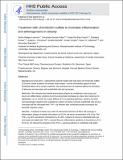Treatment with chondroitin sulfate to modulate inflammation and atherogenesis in obesity
Author(s)
Rosas, Elisabet; Dreyfuss, Juliana L.; Montell, Eulàlia; Vergés, Josep; Balcells, Mercedes; Melgar Lesmes, Pedro; Garcia Polite, Fernando; Del Rey Puech, Paula; Rosas, Elisabet Canyelles; Edelman, Elazer R; ... Show more Show less
Downloadnihms746703.pdf (1.584Mb)
PUBLISHER_CC
Publisher with Creative Commons License
Creative Commons Attribution
Terms of use
Metadata
Show full item recordAbstract
Background and aims: Osteoarthritic patients treated with high doses of chondroitin sulfate (CS) have a lower incidence of coronary heart disease - but the mechanistic aspects of these beneficial effects of CS remain undefined. We examined how CS treatment affects the formation of atheroma via interaction with endothelial cells and monocytes. Methods: We characterized arterial atheromatous plaques by multiphoton microscopy and serum pro-inflammatory cytokines by immunoenzymatic techniques in obese mice receiving CS (1 g/kg/day, i.p.) or vehicle for 6 days. Effects of CS on signaling pathways, cytokine secretion and macrophage migration were evaluated in cultures of human coronary endothelial cells and in a monocyte cell line stimulated with TNF-α by Western blot, immunoenzymatic techniques and transwell migration assays. Results: Treatment of obese mice with CS reduced the extension of foam cell coverage in atheromatous plaques of arterial bifurcations by 62.5%, the serum concentration of IL1β by 70%, TNF-α by 82% and selected chemokines by 25-35%. Cultures of coronary endothelial cells and monocytes stimulated with TNF-α secreted less pro-inflammatory cytokines in the presence of CS (P < 0.01). CS reduced the activation of the TNF-α signaling pathway in endothelial cells (pErk 36% of reduction, and NFκB 33% of reduction), and the migration of activated monocytes to inflamed endothelial cells in transwells (81 ± 6 vs. 13 ± 2, P < 0.001). Conclusions: CS interferes with the pro-inflammatory activation of monocytes and endothelial cells driven by TNF-α thus reducing the propagation of inflammation and preventing the formation of atherosclerotic plaques.
Date issued
2015-12Department
Massachusetts Institute of Technology. Institute for Medical Engineering & Science; Harvard University--MIT Division of Health Sciences and TechnologyJournal
Atherosclerosis
Publisher
Elsevier BV
Citation
Melgar-Lesmes, Pedro, et al. “Treatment with Chondroitin Sulfate to Modulate Inflammation and Atherogenesis in Obesity.” Atherosclerosis, vol. 245, Feb. 2016, pp. 82–87.
Version: Author's final manuscript
ISSN
0021-9150